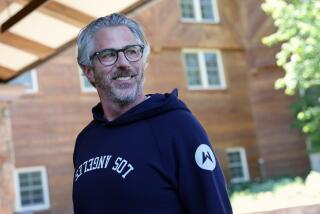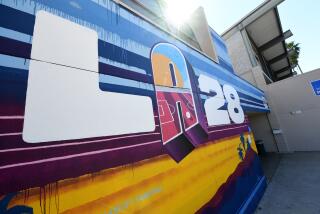AEG is playing to win in foreign arena: China
- Share via
BEIJING — For Tim Leiweke, president of the Los Angeles sports-marketing company AEG, the race for gold in China begins after the Olympics.
It’ll start with selling the naming rights for Wukesong arena, site of the Olympic basketball games. Leiweke thinks the rights can fetch at least $100 million. AEG, which owns Staples Center, Home Depot Center in Carson and the Los Angeles Kings hockey franchise, is a partner with the NBA in operating and managing the 18,000-seat indoor stadium in west Beijing.
But Leiweke has much bigger plans for Wukesong -- and China. He wants to develop and run stadiums throughout the country, filling the venues with sports, concerts and other high-profile events. In Beijing this week, he said AEG planned to spend at least $100 million in China over the next five years, adding that the company would make a more detailed announcement shortly after the Games.
“Our highest priority is Asia,” he said, sitting in the lounge at JW Marriott Hotel Beijing, his eyes shifting to an Olympic beach volleyball match on television. “We own a piece of that,” the 51-year-old remarked, referring to AEG’s stake in the AVP Pro Beach Volleyball Tour. AEG’s vast interests include boxer Oscar De La Hoya’s Golden Boy Promotions Inc., the O2 arena in London and the Hamburg Freezers hockey team in Germany.
Despite the deep pockets of AEG’s billionaire owner, Philip Anschutz, and the company’s reputation for hosting world-class sports and entertainment events at its venues, AEG is a relative newcomer to China and is little known in the country.
AEG made a splash in March when it brought its Los Angeles Galaxy soccer team for an exhibition match in Shanghai. And Leiweke has made frequent trips to other Chinese cities, including Nanjing and Qingdao, to lay the groundwork for possible new stadiums there. Even so, AEG has just a dozen staff people in China, one-tenth the number the NBA has.
The NBA is pursuing its own China dreams and is trying to reach a deal with the Chinese Basketball Assn. that would extend its reach in the basketball-crazed nation. (The NBA wouldn’t divulge details.)
The NBA and AEG teamed up to help the owner of Wukesong create an American-style stadium, replete with restaurants and VIP suites. Since then, there’s been widespread speculation that the pair would expand their partnership to develop and operate as many as a dozen stadiums in China.
Both sides say such talk is premature, not that there isn’t interest from Chinese cities for new sports facilities. “We’re getting approached,” said Heidi Ueberroth, head of the NBA’s international business, speaking at the Beijing Great Theater, an elegant restaurant near Wukesong arena that the NBA booked during 10 days of the Olympics -- purportedly at a cost of $800,000 -- to host “private hospitality” meals and talks with partners and special guests.
Leiweke said he and a dozen of his global managers were meeting in Beijing during the Games with government officials, sponsors and Chinese sports federations. Riding on the NBA’s popularity -- and connections -- in China would clearly help AEG in its push into Asia. NBA China is headed by Timothy Chen, the former head of Microsoft’s China operations.
Even then, AEG will have its work cut out for itself.
China’s sports market is growing fast -- and it will get a boost from the Olympics -- but it’s comparatively small and undeveloped. Spending for athletic events and sporting goods accounts for about 3% of a typical Western nation’s economy, but it’s just 0.2% to 0.3% in China, said Zhang Qing, chief of Key-Solution Sport Consulting Co. in Beijing.
That means there’s a lot of potential in China, Zhang added. He said he had never heard of AEG but suggested that it be prepared for a long slog. One big reason: the lack of professional teams and leagues that operate under market rules, Zhang said. The government’s Sports Bureau exercises strong control over professional sports, most players have little clout to bargain terms, and few have agents.
AEG’s first crucial test in China may be how many events it can book for Wukesong arena. Experts say at least 100 days in a year will be needed for AEG and the NBA to secure premium dollars for the stadium’s naming rights and to keep the facility in the black. A full season of CBA games would help, as would games that feature top NBA players, who are immensely popular in China. Leiweke sees other sporting events and musical concerts to throw into the mix.
“We think a badminton world championship in our arena is something we want to pursue,” he said. “I’m convinced we can do 120 nights a year of events.”
Leiweke can count on demand for sporting events and large-scale entertainment to grow as Chinese incomes rise and people spend more time on leisure activities.
“When people play basketball more often, they would also like to watch it more often,” Zhang said. “And they would not be satisfied by watching it on TV but would like to watch it in the stadium.”
Some analysts consider the Olympics a turning point in the development and commercialization of sports in China. The NBA’s Ueberroth said the U.S.-China Olympic basketball match-up Aug. 10 was the most-watched basketball game ever, with live viewership in China alone estimated at 170 million.
“During the Olympics, Chinese audiences got to know more new types of sports and thus started to have interest in some of the matches,” said Ren Hai, director of the Center for Olympic Studies at the Beijing University of Physical Education. “For example, many never knew about bicycle motocross but started to find it quite fun this time and will be willing to watch it more in the future.”
After the Olympics, the focus will shift to Shanghai for the World’s Fair and to Guangzhou for the Asian Games, both to be held in 2010. Both cities are looking at new stadiums. Other cities also will probably be competing to build arenas to spur tourism and generate tax revenue.
The harder part will be securing the right events. Anybody, especially foreigners, who serves up cultural fare or entertainment to the masses can expect heavy scrutiny.
“In China,” Ren said, “you will face lots of government interference.”
--
--
(BEGIN TEXT OF INFOBOX)
AEG’s presence
AEG owns or controls:
Venues
Staples Center (Los Angeles)
El Rey Theatre (Hollywood)
Home Depot Center (Carson)
Prudential Center (Newark, N.J.)
Sprint Center (Kansas City, Mo.)
Rose Garden (Portland, Ore.),
WaMu Theatre (Seattle)
Colosseum at Caesars Palace (Las Vegas)
Target Center (Minneapolis)
Rentschler Field (Hartford, Conn.)
XL Center (Hartford, Conn.)
Nokia Theatre Times Square (New York)
Nokia Theatre at Grand Prairie (Grand Prairie, Texas)
Acer Arena (Sydney, Australia)
Color Line Arena (Hamburg, Germany)
O2 (London)
Sports franchises
Los Angeles Kings (NHL)
Los Angeles Riptide (Major League Lacrosse)
Manchester (N.H.) Monarchs (American Hockey League)
Reading (Pa.) Royals (ECHL, a AA hockey league)
Houston Dynamo and Los Angeles Galaxy (MLS)
Two hockey franchises in Europe
Hammarby (Sweden) Fotboll Club
--
Source: Times research
More to Read
Go beyond the scoreboard
Get the latest on L.A.'s teams in the daily Sports Report newsletter.
You may occasionally receive promotional content from the Los Angeles Times.











